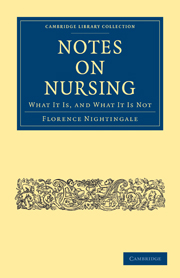Book contents
- Frontmatter
- PREFACE
- Contents
- Introductory
- I Ventilation and Warming
- II Health of Houses
- III Petty Management
- IV Noise
- V Variety
- VI Taking Food
- VII What Food
- VIII Bed and Bedding
- IX Light
- X Cleanliness of Rooms and Walls
- XI Personal Cleanliness
- XII Chattering Hopes and Advices
- XIII Observation of the Sick
- Conclusion
- Supplementary Chapter
- NOTES ON NURSING
XIII - Observation of the Sick
Published online by Cambridge University Press: 05 August 2011
- Frontmatter
- PREFACE
- Contents
- Introductory
- I Ventilation and Warming
- II Health of Houses
- III Petty Management
- IV Noise
- V Variety
- VI Taking Food
- VII What Food
- VIII Bed and Bedding
- IX Light
- X Cleanliness of Rooms and Walls
- XI Personal Cleanliness
- XII Chattering Hopes and Advices
- XIII Observation of the Sick
- Conclusion
- Supplementary Chapter
- NOTES ON NURSING
Summary
There is no more silly or universal question question, scarcely asked than this, “Is he better?” Ask it of the medical attendant, if you please. But of whom else, if you wish for a real answer to your question, would you ask it? Certainly not of the casual visitor; certainly not of the nurse, while the nurse's observation is so little exercised as it is now. What you want are facts, not opinions—for who can have any opinion of any value as to whether the patient is better or worse, excepting the constant medical attendant, or the really observing nurse?
The most important practical lesson that can be given to nurses is to teach them what to observe—how to observe—what symptoms indicate improvement—what the reverse—which are of importance—which are of none—which are the evidence of neglect—and of what kind of neglect.
All this is what ought to make part, and an essential part, of the training of every nurse. At present how few there are, either professional or unprofessional, who really know at all whether any sick person they may be with is better or worse.
The vagueness and looseness of the information one receives in answer to that much abused question, “Is he better?” would be ludicrous, if it were not painful. The only sensible answer (in the present state of knowledge about sickness) would be “How can I know? I cannot tell how he was when I was not with him.”
- Type
- Chapter
- Information
- Notes on NursingWhat It Is, and What It Is Not, pp. 150 - 182Publisher: Cambridge University PressPrint publication year: 2010First published in: 1860



